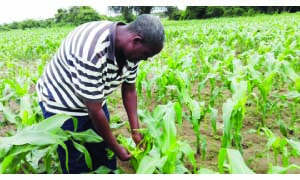By HAPPY MULOLANI –
MANY studies show that Fall armyworms (FAW) have been ravaging farmers’ maize crop for some time now.
To tackle this problem requires concerted efforts in developing long term strategies which are effective and sustainable in order to improve livelihoods.
Previous studies show that to effectively control FAW, it is key to use other management strategies such as biopesticides, biological control, intercropping and agroecological methods.
For instance, conservation agriculture and intercropping with legumes are some of the appropriate interventions which have reduced levels of crop damage.
What is important to understand is that the fight against FAW can only be won if Government and its partners invest in long term solutions which are more sustainable to FAW management through Integrated Pest Management (IPM).
According to World Agroforestry (ICRAF) Senior Researcher Rhett Harrison, the Government needs to invest in IPM strategies to enable farmers in Zambia to effectively and sustainably manage the pest.
“A number of safe botanical and biological based pesticides, as well as safe chemical pesticides, have also been identified and can be recommended for use when pest populations surpass critical thresholds. Our research has found that although FAW occurs in every field, often populations never reach threshold levels. In fact, in most fields, they decline through the season,” Professor Harrison says.
His sentiments come in the wake of the Government’s recent allocation of funds amounting to K46.575million to the Ministry of Agriculture for the management of FAW in the country, which is commendable.
“The Government can invest funds in developing capacity for biological control, through the breeding and mass release of natural enemies, or alternative control agents, such as fungi and nematodes, which is more sustainable,” Prof Harrison says.
He suggests that the Government considers allocating funds to develop national capacity for breeding predators and parasitoids for augmentative biological control.
Coupled with that, suitably qualified extension staff who are trained and are able to assess FAW populations need to provide pesticides for surpassed thresholds, as well as distribute safe and effective chemical and biological/botanical pesticides to farmers along with Personal Protective Equipment (PPE) and training of all safe application of pesticides.
Additionally, investing funds in research for IPM needs to be inclusive of development of alternative control agents like fungi and nematodes, agroecological approaches and crop insurance.
In addition, consideration should be given to developing training materials and providing training courses on IPM for FAW.
These suggestive measures are likely to yield positive results in the long-term and more sustainable.
Presently, the World Agroforestry (ICRAF) is working collaboratively with Zambia Agricultural Research Institute (ZARI) and the Department of Agriculture in the Ministry of Agriculture, as well as the University of Zambia (UNZA), along with farmers and other stakeholders engaged in a five-year research project which aims at monitoring FAW in smallholder farmers’ fields across six landscapes in Zambia.
This is being done through experiments using agroecological methods.
The idea is to provide the Government and the various stakeholders with appropriate strategies which strive to develop and adopt IPM for FAW in Zambia.
Prof Harrison observes that the use of pesticides in managing the pest is not a long term solution per se as studies show that the use of synthetic insecticides is not only costly to smallholder farmers but also poses serious risks to human health and the environment.
“Many pesticides are also not effective against fall armyworms due to its capacity to develop resistance and its behavior of hiding in the leaf whorl,” he says.
The professor warns that most importantly, overuse of pesticides negatively impacts natural enemies, such as ants, earwigs, spiders and other insect-eating arthropods that prey on FAW.
He said these organisms significantly reduce infestation levels, thereby securing farmer livelihoods.
As at present, more than half the districts in the country have witnessed farmers’ fields being infested with fall army worms.
“96 districts out of 116 districts have reported outbreaks. So far, the Fall armyworms outbreak has affected 129,517 households and 96,221.50 hectares of maize fields,” Agriculture Minister Reuben Mtolo said.
Mr Mtolo further explained that a total of 110,000 litres of chemicals has been distributed in all the 10 provinces, while items purchased include; protective equipment like sprayers, gum boots and work suits.
He also urged farmers to adopt conservation agricultural practices such as crop rotation, as it reduces the threat of fall army worms.
Ministry of Agriculture Permanent Secretary Green Mbozi said the Government alternates the chemicals distributed to provinces to avoid any form of resistance. In this way, the efforts to curb the pest infestation is heightened.
Government’s immediate intervention of distributing chemicals to areas already reported of fall armyworm outbreaks is aimed at minimizing damage to the maize crop and averting a decline in food security.
Government’s effort to bring together key players on board such as scientists, extension workers and policy makers is apparent as this will necessitate the formulation of appropriate IPM strategies to manage FAW which are best suited to the different farming systems and agro-ecological zones within the Zambian context.
With government’s support, it is hoped interventions to scale up efforts in deriving long-term sustainable management practices of fall army worms among farmers and ensure a multisectoral approach will be prioritized to finance Integrated Pest Management strategies, bearing in mind that a strong coordinated approach needs to be enforced to sustainably control army worms at national level given the growing threat of the FAW. – NAIS.







